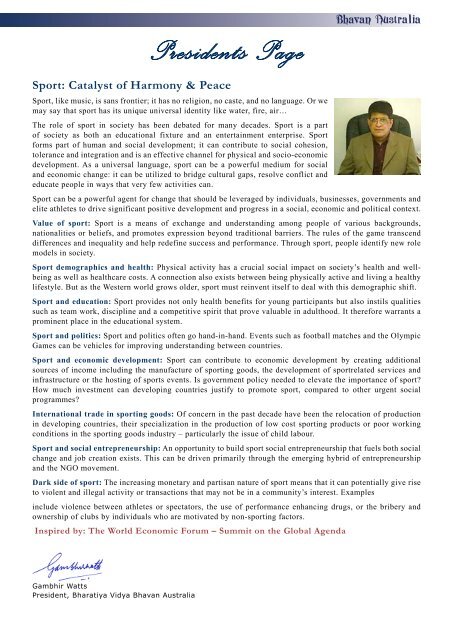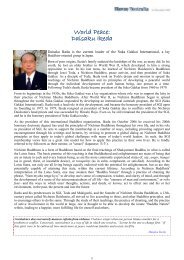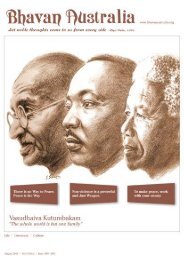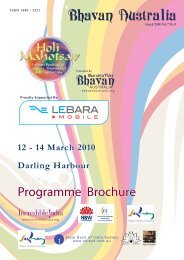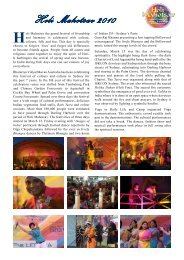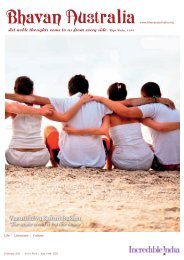'The whole world is but one family' - Bharatiya Vidya Bhavan Australia
'The whole world is but one family' - Bharatiya Vidya Bhavan Australia
'The whole world is but one family' - Bharatiya Vidya Bhavan Australia
Create successful ePaper yourself
Turn your PDF publications into a flip-book with our unique Google optimized e-Paper software.
Gambhir Watts<br />
President, <strong>Bharatiya</strong> <strong>Vidya</strong> <strong>Bhavan</strong> <strong>Australia</strong><br />
Presidents Page<br />
Sport: Catalyst of Harmony & Peace<br />
Sport, like music, <strong>is</strong> sans frontier; it has no religion, no caste, and no language. Or we<br />
may say that sport has its unique universal identity like water, fire, air…<br />
The role of sport in society has been debated for many decades. Sport <strong>is</strong> a part<br />
of society as both an educational fixture and an entertainment enterpr<strong>is</strong>e. Sport<br />
forms part of human and social development; it can contri<strong>but</strong>e to social cohesion,<br />
tolerance and integration and <strong>is</strong> an effective channel for physical and socio-economic<br />
development. As a universal language, sport can be a powerful medium for social<br />
and economic change: it can be utilized to bridge cultural gaps, resolve conflict and<br />
educate people in ways that very few activities can.<br />
Sport can be a powerful agent for change that should be leveraged by individuals, businesses, governments and<br />
elite athletes to drive significant positive development and progress in a social, economic and political context.<br />
Value of sport: Sport <strong>is</strong> a means of exchange and understanding among people of various backgrounds,<br />
nationalities or beliefs, and promotes expression beyond traditional barriers. The rules of the game transcend<br />
differences and inequality and help redefine success and performance. Through sport, people identify new role<br />
models in society.<br />
Sport demographics and health: Physical activity has a crucial social impact on society’s health and wellbeing<br />
as well as healthcare costs. A connection also ex<strong>is</strong>ts between being physically active and living a healthy<br />
lifestyle. But as the Western <strong>world</strong> grows older, sport must reinvent itself to deal with th<strong>is</strong> demographic shift.<br />
Sport and education: Sport provides not only health benefits for young participants <strong>but</strong> also instils qualities<br />
such as team work, d<strong>is</strong>cipline and a competitive spirit that prove valuable in adulthood. It therefore warrants a<br />
prominent place in the educational system.<br />
Sport and politics: Sport and politics often go hand-in-hand. Events such as football matches and the Olympic<br />
Games can be vehicles for improving understanding between countries.<br />
Sport and economic development: Sport can contri<strong>but</strong>e to economic development by creating additional<br />
sources of income including the manufacture of sporting goods, the development of sportrelated services and<br />
infrastructure or the hosting of sports events. Is government policy needed to elevate the importance of sport?<br />
How much investment can developing countries justify to promote sport, compared to other urgent social<br />
programmes?<br />
International trade in sporting goods: Of concern in the past decade have been the relocation of production<br />
in developing countries, their specialization in the production of low cost sporting products or poor working<br />
conditions in the sporting goods industry – particularly the <strong>is</strong>sue of child labour.<br />
Sport and social entrepreneurship: An opportunity to build sport social entrepreneurship that fuels both social<br />
change and job creation ex<strong>is</strong>ts. Th<strong>is</strong> can be driven primarily through the emerging hybrid of entrepreneurship<br />
and the NGO movement.<br />
Dark side of sport: The increasing m<strong>one</strong>tary and part<strong>is</strong>an nature of sport means that it can potentially give r<strong>is</strong>e<br />
to violent and illegal activity or transactions that may not be in a community’s interest. Examples<br />
include violence between athletes or spectators, the use of performance enhancing drugs, or the bribery and<br />
ownership of clubs by individuals who are motivated by non-sporting factors.<br />
Inspired by: The World Economic Forum – Summit on the Global Agenda


